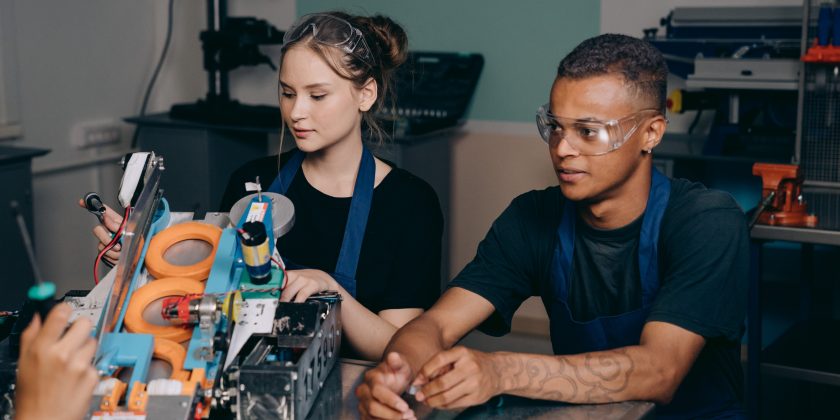
The Impact of Video in Manufacturing Training and Employee Onboarding
In the world of manufacturing, employee training and onboarding play a crucial role in ensuring the smooth operation of production processes. Traditionally, these processes have relied heavily on in-person training sessions, manuals, and on-the-job shadowing. However, with the rapid advancements in technology, particularly in the realm of video production and dissemination, the landscape of training and onboarding in the manufacturing industry is undergoing a significant transformation.
Video has emerged as a powerful tool for delivering training and onboarding content in manufacturing. It provides a dynamic and engaging medium through which complex concepts and procedures can be effectively communicated. From instructional videos to virtual simulations, the impact of video in manufacturing training and employee onboarding is far-reaching and multifaceted.
Enhance comprehension and retention of information with training video
One of the key benefits of using video in manufacturing training is its ability to enhance comprehension and retention of information. Visual content is inherently more stimulating and memorable than text-based materials. Studies have shown that people retain information better when it is presented in a visual format. By incorporating video into training programs, manufacturing companies can ensure that their employees have a solid understanding of the processes, safety protocols, and best practices required to perform their jobs effectively.
Standardization of training content
Video also allows for the standardization of training content across different locations and shifts. In manufacturing, consistency is vital to ensure quality control and minimize errors. By using video, companies can deliver uniform training experiences to employees. Regardless of their physical location or the time of day they receive the training. This not only saves time and resources but also ensures that every employee receives the same information and skills necessary to perform their duties.
Reducing the learning curve
Furthermore, video-based training can significantly reduce the learning curve for new employees during the onboarding process. Traditional onboarding methods often involve shadowing experienced workers, which can be time-consuming and dependent on the availability of mentors. With video, new hires can access comprehensive onboarding materials at their convenience, allowing them to learn at their own pace. They can replay videos, pause, and rewind as needed, ensuring they grasp the necessary knowledge and skills before entering the production floor.
Improve safety
In addition to facilitating comprehension and standardization, video training can also improve safety in the manufacturing industry. Working in a manufacturing environment often involves operating complex machinery and adhering to strict safety protocols. By using video, companies can create realistic simulations that demonstrate potential hazards and how to mitigate them. Employees can observe and understand potential risks without exposing themselves to actual danger. This immersive and risk-free training can help reduce accidents and injuries, promoting a safer work environment.
Scalability
Another advantage of video in manufacturing training and onboarding is its scalability. As companies expand their operations or introduce new products, the need for training and onboarding grows. Video-based training allows for easy replication and distribution of content, eliminating the need for expensive and time-consuming in-person training sessions. Instead, companies can produce high-quality videos once and deliver them to employees across multiple locations and shifts. This ensures consistency and reducing costs associated with travel and accommodations.
Interactive and experiential learning
Moreover, video training provides an opportunity for interactive and experiential learning. With the use of interactive elements such as quizzes, assessments, and branching scenarios, employees can actively participate in their own learning process. This engagement increases motivation and knowledge retention, as learners are actively involved in applying what they’ve learned. Video can also be combined with virtual reality (VR) technology to create immersive training experiences. This allows employees to practice their skills in a realistic and controlled virtual environment.
Manufacturing training videos accessibility
The accessibility of video-based training is another significant advantage. In today’s digital age, employees are accustomed to consuming information through digital platforms and devices. By delivering training content in video format, manufacturing companies can meet employees’ expectations for on-demand and mobile-friendly learning experiences. Employees can access training videos anytime, anywhere, using their smartphones, tablets, or computers. This flexibility enables them to fit training into their schedules without disrupting their daily tasks, leading to increased productivity.
Collaboration and knowledge
Furthermore, video-based training can foster collaboration and knowledge sharing among employees. By creating a repository of training videos, companies can build a valuable knowledge base that can be accessed by employees at any time. Experienced workers can share their expertise through video tutorials, tips, and best practices, creating a culture of continuous learning and improvement within the organization. This knowledge sharing not only enhances individual performance but also contributes to the overall growth and innovation of the company.
Our Video Example
Conclusion
In conclusion, video has revolutionized training and onboarding in the manufacturing industry. Its visual and interactive nature enhances comprehension, standardizes training content, reduces the learning curve, improves safety, and increases scalability. By incorporating video into their training programs, manufacturing companies can provide engaging and effective learning experiences for employees, ultimately leading to enhanced productivity, efficiency, and overall success. As technology continues to advance, video will undoubtedly play an increasingly pivotal role in shaping the future of training and employee onboarding in manufacturing and beyond.
Still have a few questions about adding video to your marketing strategy?
Schedule a Discovery Session to see how our talents can match your vision.



